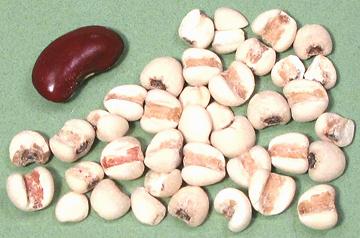 [Coix, Coixseed, Adlay, Adlal; Hot bo bo (Viet); Yuuki hatomugi (Japan);
Coix lacryma-jobi var. ma-yuen | Rosary beads:
Coix lacryma-jobi var. lacryma-jobi ]
[Coix, Coixseed, Adlay, Adlal; Hot bo bo (Viet); Yuuki hatomugi (Japan);
Coix lacryma-jobi var. ma-yuen | Rosary beads:
Coix lacryma-jobi var. lacryma-jobi ]
Two varieties of the is tropical grass are grown, one as a grain and the other for hard shelled beads. While native to Southeast Asia and grown there in mountainous regions, this plant is now also grown in the southern United States and in the tropical Americas. It is usually pearled except in Japan where it is used "brown". This grain is used in soups and to make teas and beverages, including distilled alcoholic beverages. In the Asian markets here in Los Angeles, and I presume elsewhere in North America, it is always packaged as "Pearl Barley", though it is easily recognized from its large size and deep groove on one side.
More on Other Grains.
This grain has a light pleasant flavor somewhere between barley and wheat and with a unique aromatic twist. It's resistance to overcooking makes it an excellent ingredient in soups.